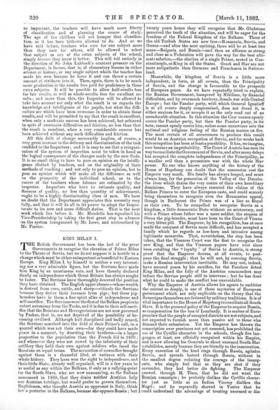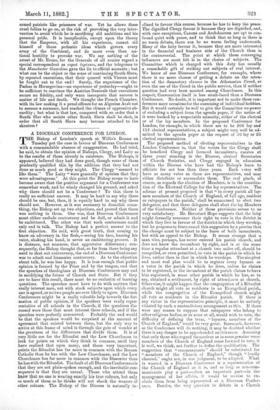KING MILAN I.
THE British Government has been the last of the great Governments to recognise the elevation of Prince Milan to the Throne of Servia, but we do not suppose it is hostile to a change which must be either unimportant or beneficial to Eastern Europe. King Milan I. by himself is neither a very interest- ing nor a very admirable figure, but the Servians have made him King by an unanimous vote, and have thereby declared finally an independence which Great Britain has always sought to foster. The Servians have thoroughly deserved the position they have obtained. The English upper classes—whose wealth is derived from corn; cattle, and sheep—ridicule the Servians because they derive their incomes from pigs ; but these pig- breeders have in them a fine spirit alike of independence and self-sacrifice. The Servians were the first of the Balkan peoples to extort autonomy from the Turks, and it is due to their self-sacri- fice that the Bosnians and Herzegovinians are not now governed by Pashas, that is, are not deprived of the possibility of be- coming civilised. Although half disciplined and badly armed, the Servians marched into the field at their Prince's call, in a quarrel which was not their own—for they could have made peace in a moment, by deserting their brethren—in a larger proportion to the population than the French did in 1870 ; and whenever they were not cowed by the inferiority of their artillery they held their own against soldiers who faced the Russians on equal terms. The accusation of cowardice brought against them is a shameful libel, at variance with their whole history. They have won the right to independence, and their little State, already well organised, will in a few years be as useful as any within the Balkans, if only as a rallying-point for the South Slays, who are now announcing, as the Italians announced in 1860, that they desire neither Austrian help nor Austrian tutelage, but would prefer to govern themselves. Englishmen, who thought Austria an oppressor in Italy, think her a protector in the Balkans, because she opposes Russia ; but
twenty years hence they will recognise that Mr. Gladstone perceived the truth of the situation, and will be eager for the freedom of the Federal Kingdom of the Balkans. Three of the old Turkish States are now free—Roumania, Servia, and Greece —and after the next uprising, there will be at least two more—Bulgaria and Bosnia—and then an alliance as strong and close as a Federation will pave the way for the best ulti- mate solution,—the election of a single Prince, seated in Con- stantinople, as King in all the States. Greek and Slav are not more antipathetic than Germans and Frenchmen in Switzer- land.
Meanwhile, the kingdom of Servia is a little more independent, in form, at all events, than the Principality of Servia, and the change is favourable to the prospects of European peace. As we have repeatedly tried to explain, the Russian Government, hampered by Nihilism, by financial difficulties, and by overmuch territory, dreads war with Central Europe ; but the Panslav party, with which General Ignatieff is at all events deeply compromised, does not dread it, is either anxious for it, or accepts it as the only road out of an unendurable situation. In this situation the Czar cannot openly coerce the Panslav party, but then the Panslav party, in its turn, cannot openly coerce him, unless some occurrence sets the national and religious feeling of the Russian masses on fire. The most certain of all occurrences to produce this result would be an Austrian occupation of Servia, and for weeks back this occupation has been at least a possibility. It has, we imagine, now become an improbability. The Court of Austria has seen its way to conciliate the Government of Servia, and after many delays has accepted the complete independence of the Principality, as a smaller evil than a premature war with the whole Slav power. No one who knows anything of the history of the House of Hapsburg can doubt that the concession cost the Emperor very much. His family has always longed, and must always long, for the possession of the Valley of the Danube, the river which drains the very centre of their own hereditary dominions. They have always resented the claims of the Balkan Princes to enter the European caste, and could scarcely bring themselves to recognise even the Roumanian appeal, though in Bucharest the Prince was of a line as Royal as their own. To be compelled to recognise Servia as a kingdom, a little democratic State without an aristocracy, and with a Prince whose father was a mere soldier, the stepson of Obren the pig-breeder, must have been to the Court of Vienna a very bitter pill. The Emperor, by his recognition, has at once made the conquest of Servia more difficult, and has accepted a family which he regards as low-born and intrusive among legitimate monarchs. That, nevertheless, the step has been taken, that the Viennese Court was the irst to recognise the new King, and that the Viennese papers have ever since been extolling the " loyalty " of Servia to Austria, is strong proof that the Emperor desires, at all events, to post- pone the final struggle ; that he will not, by coercing Servia, make a Russian intervention inevitable. He may not, indeed, have secured peace by his sacrifice, for the Panslays detest King Milan, and the folly of the Austrian commanders may induce the Servian people still to intervene ; but he has done what he could to make the conflict less unavoidable.
Why the Emperor of Austria allows his agents to embitter the contest so deeply, is one of those mysteries of European government which are only explicable on the theory that the Sovereigns themselves are fettered by military traditions. It is of vital importance to the House of Hapsburgto conciliate all South Slays. It is the personal policy of the Emperor to acquire Bosnia, as compensation for the loss of Lombardy. It is matter of Euro- pean law that the people of occupied districts are not subjects, and not expected to furnish more than passive aid to those who demand their submission. Yet the Emperor has thrown the conscription over provinces not yet annexed, has prohibited the use of the Cyrillic character in the schools, though five lan- guages, at least, are officially recognised within his Empire, and is now allowing his Generals to shoot unarmed South Slav notabilities, merely because they are friendly to the insurrection. Every execution of the kind rings through Russia, agitates ' Servia, and spreads hatred through Bosnia, without in the smallest degree reducing the courage of the insurg- ents, who simply feel that as they are shot if they surrender, they had better die fighting. The Emperor avowed, through M. Tisza, that he did not want the Bosnian conscripts ; he probably dislikes the Cyrillic charac- ter just as little as an Indian Viceroy dislikes the Nagn ; and he repeatedly showed in Venice that he could understand the advantage of treating unarmed or dis- armed patriots like prisoners of war. Yet he allows these cruel follies to go on, at the risk of provoking the very inter- vention to avoid which he is sacrificing old ambitions and his personal pride. It is inexplicable, except upon the theory that the Emperor, with all his experience, cannot rid himself of those pedantic ideas which govern every army of the Continent, and do more even than na- tional hostility to provoke war. We say nothing of the arrest of Mr. Evans, for the Generals of all armies regard a special correspondent as caput lupinum, and the telegrams to the Manchester Guardian gave the lie to official accounts ; but what can be the object or the sense of convincing South Slays, by repeated executions, that their quarrel with Vienna must be fought out to the end? Surely, the experience of the Pashas in Herzegovina—an experience of yesterday—ought to be sufficient to convince the Austrian Generals that executions secure no fidelity, and only warn insurgents that success is matter of life and death. We thought the French Chamber, with its law making it a penal offence for an Algerine Arab not to assume a surname, had reached the climax of oppressive ab- surdity ; but what is that law, compared with an order that a South Slav who assists other South Slays shall be shot, in order that all South Slays may become attached to the shooters ?



































 Previous page
Previous page